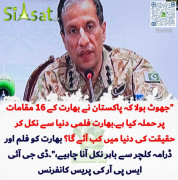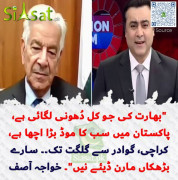digitalzygot
Senator (1k+ posts)
A former Indian foreign secretary, while recently making a speech at the United States Institute of Peace, warned that if India felt it was being excluded from Afghanistans political future, New Delhi would be compelled to revive the old Russia-Iran-India alliance, which would counterbalance the US security interests in Afghanistan. The statement, which symbolizes New Delhis growing panic, is meaningful in historical and regional contexts. It essentially makes the point that the Indians are desperate to get a foothold in Afghanistan.
A critical point to remember is that India was the only South Asian country to recognise the Soviet-backed Democratic Republic of Afghanistan in the 1980s while the whole world opposed it. However, New Delhi lost much of its influence in the country during the Afghan civil wars and takeover by the Taliban in the Nineties.
Nevertheless, New Delhi tried to bounce back following 9/11. It established diplomatic relations with Kabul, offered massive humanitarian and economic aid and participated in reconstruction efforts. New Delhi also started investing in rebuilding of air links, power plants, health and education sectors and training of Afghan civil servants, diplomats and police. The Indian Army also got involved in the war torn country by constructing a major road in the remote Afghan province of Nimroz.
The question arises why the Indians want to have a permanent role in Afghanistan. There are four aspects to the answer. The first and foremost reason, of course, is to deny Pakistan strategic depth in case of war with India.
But the second reason is even more important. The Indians seek to foment trouble in Pakistan through the western border, which is unstable, porous and very long. They are already doing it on a massive scale from their several consulates in the country.
Thirdly, the Indian manipulations in Afghanistan would also check future Chinese influence in the country.Fourth, New Delhi has started looking at itself as a policeman in the region and a role in Afghanistan fits with that image.
However, it is Pakistan that shares the long border and strong cultural and religious ties with Afghanistan. Any turmoil in Afghanistan directly affects the neighbouring countries, mostly Pakistan. India, which has been responsible for the historically negative influence in the region, has little stake in it.
Given the geopolitical realities, the fact remains the region could do well without the Indian interference in Afghanistan. The Americans, in view of patterns of recent history and those patterns shaping the events today, should recognise the fact that Pakistan offers the best bet to a peaceful and stable Southwest Asia, especially Afghanistan.
A critical point to remember is that India was the only South Asian country to recognise the Soviet-backed Democratic Republic of Afghanistan in the 1980s while the whole world opposed it. However, New Delhi lost much of its influence in the country during the Afghan civil wars and takeover by the Taliban in the Nineties.
Nevertheless, New Delhi tried to bounce back following 9/11. It established diplomatic relations with Kabul, offered massive humanitarian and economic aid and participated in reconstruction efforts. New Delhi also started investing in rebuilding of air links, power plants, health and education sectors and training of Afghan civil servants, diplomats and police. The Indian Army also got involved in the war torn country by constructing a major road in the remote Afghan province of Nimroz.
The question arises why the Indians want to have a permanent role in Afghanistan. There are four aspects to the answer. The first and foremost reason, of course, is to deny Pakistan strategic depth in case of war with India.
But the second reason is even more important. The Indians seek to foment trouble in Pakistan through the western border, which is unstable, porous and very long. They are already doing it on a massive scale from their several consulates in the country.
Thirdly, the Indian manipulations in Afghanistan would also check future Chinese influence in the country.Fourth, New Delhi has started looking at itself as a policeman in the region and a role in Afghanistan fits with that image.
However, it is Pakistan that shares the long border and strong cultural and religious ties with Afghanistan. Any turmoil in Afghanistan directly affects the neighbouring countries, mostly Pakistan. India, which has been responsible for the historically negative influence in the region, has little stake in it.
Given the geopolitical realities, the fact remains the region could do well without the Indian interference in Afghanistan. The Americans, in view of patterns of recent history and those patterns shaping the events today, should recognise the fact that Pakistan offers the best bet to a peaceful and stable Southwest Asia, especially Afghanistan.






























